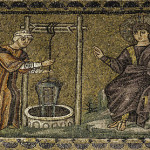We run our website the way we wished the whole internet worked: we provide high quality original content with no ads. We are funded solely by your direct support. Please consider supporting this project.
What makes the claim that Jesus rose from the dead unique?
Question: What makes the story of Jesus’ resurrection different from other pagan resurrection stories, such as those surrounding the Egyptian god Osiris?
Answer: In Lord or Legend? (and more academically, The Jesus Legend), Paul Eddy and I address this, and many other, objections to faith in Jesus. I encourage you to check either of these books out. But basically, if one examines the details of the various mythic accounts of dying and rising gods, there really aren’t many impressive parallels to the Gospel accounts.
For example, consider the example you yourself give. As the story goes (at least according to one of the versions that’s come down to us) Osiris was killed by his brother, chopped up into fourteen pieces and scattered throughout Egypt. Isis then rescued all but one of his body parts, reassembled them and brought him back to life. He was then given rulership of the underworld (the realm of the dead). To claim that this account “parallels” the Jesus story is quite a stretch, to say the least. Indeed, it’s not even clear we should call it a resurrection account since Osiris was never fully reconstituted. Not only this, but poor Osiris really wasn’t brought back to “life” at all since his resuscitated rulership remained in the realm of the dead!
If you examine all the alleged parallels to the Jesus story, this is pretty much what you find. Like they say, “the devil is in the details.”
Having said this, I want grant that there are vague parallels to the Jesus story in pagan myths throughout history and around the globe. But far from concluding that these vague parallels in any way discount the historicity of the Jesus story, Paul and I argue that they actually confirm it. If the Jesus story is in fact true, we should expect parallels like this to exist. After all, one aspect of the Jesus story, extending back into the Old Testament, is the teaching that humans are made in the image of God (Gen. 1:26-28). We’re thus “wired” for God, if you will. Not only this, but the New Testament itself declares that Jesus is the light “of all people” (John 1:4, 9) who is always working in the hearts of all people to lead them back to himself (Acts 17:26-28, cf. Rom 1:19-20). We should thus expect to find “echoes” of the Jesus story expressed in the myths and legends of all people.
Category: Q&A
Tags: Jesus, Q&A
Topics: Jesus: Lord or Legend
Related Reading

The “Christus Victor” View of the Atonement
God accomplished many things by having his Son become incarnate and die on Calvary. Through Christ God revealed the definitive truth about himself (Rom 5:8, cf. Jn 14:7-10); reconciled all things, including humans, to himself (2 Cor 5:18-19; Col 1:20-22), forgave us our sins (Ac 13:38; Eph 1:7); healed us from our sin-diseased nature (1…

God is Different Than You Think
The revelation of “[a] God humiliated even unto the cross,” as Pascal put it, flies in the face of what most Jews of Jesus’ time, and of what most people throughout history, have expected God to be. In this light, we can discern the thematic centrality of the cross in Jesus’ many teachings that reverse…

What is the significance of Hosea 11:8–9?
After plotting severe judgment against Israel (vs. 5–7) the Lord says, “My heart recoils within me; my compassion grows warm and tender. I will not execute my fierce anger… I will not come in wrath.” This passage shows that God experiences conflict between his compassion and his justice and that he sometimes alters his plans…

What is the significance of Genesis 2:19 ?
“So out of the ground the Lord God formed every animal of the field and every bird of the air, and brought them to the man to see what he would call them; and whatever the man called every living creature, that was the name.” God wanted Adam to have authority over the animal kingdom…

Sermon Clip: Keeping Christmas
Through Christ, God fulfills all his promises, and by yielding to him and giving up control, we can set ourselves free. Full Sermon here: http://whchurch.org/sermons-media/sermon/keeping-christmas
